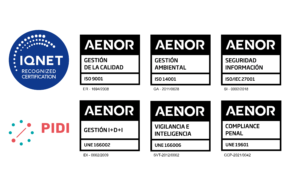The SPEEDIER project (SME Program for Energy Efficiency through Delivery and Implementation of EneRgy Audits) has launched its official report on the surveys performed on the discovery of the main barriers for Small & Medium Enterprises (SMEs) for the implementation of energy efficiency measures in four European pilot regions targeted in the project: Ireland, Italy, Romania, and Spain.
For the obtainment of these results, two separate surveys were conducted between the periods 10th October to 18th November 2019. The collated results enabled the project to refine the SPEEDIER Service to better suit the needs of the foreseen experts and tailored for conditions in each market. A total of 84 SMEs and 91 stakeholders responded to these online surveys.
Level of implementation of energy audits among SMEs
The majority of SMEs answering the survey stated that they do not have a dedicated Energy Manager, nor an energy policy and have not set any targets for reducing energy consumption. This demonstrates that energy efficiency is considered a low priority for SMEs in comparison to other factors related to running a business. Despite the requirement in Article 8 of the Energy Efficiency Directive for Members States to implement support schemes that encourage SMEs to undertake energy audits and implement the recommended energy-saving measures, most SMEs surveyed in all pilot regions have not had an energy audit in the last 5 years. In addition, most energy experts do not receive any kind of local or national government support for the delivery of energy audits or other energy efficiency support services. These results indicate that such support schemes either do not exist, are ineffective and/or are not widely known and show that Member States still need to do more to engage and activate the SME market for energy management.
Energy efficiency measures adopted and staff awareness
Despite the low proportion of SMEs undertaking energy audits, most SMEs surveyed have still implemented some kind of Energy Conservation Measure (ECM). The most commonly deployed ECM is upgrading to LED lights. However, the proportion of SMEs that have implemented any ECMs other than lighting is much lower. This shows that there is a great need across the pilot regions for a service like SPEEDIER that can assist and guide SMEs through the implementation of more complex ECMs.
An additional point of note is that few SMEs have undertaken any kind of staff awareness programme relating to energy efficiency. The SPEEDIER project can support further savings by encouraging the delivery of staff awareness programmes that will accelerate the build-up of the revolving energy efficiency fund and free up capital for the implementation of further ECMs.
Divergences per pilot region
Despite some similarities observed, the results from the survey also show that there are considerable differences between the pilot countries. This indicates that the SPEEDIER Service should be tailored accordingly to meet the needs of each market in order to help secure success. For Irish respondents, the main challenge is their lack of knowledge on which measures are the most appropriate for their business and how to procure them. In contrast to Italian, Spanish and Romanian SMEs, lack of finance is perceived as the main barrier. Having no control over the building to enable the implementation of ECMs is also a significant challenge for Spanish and Romanian SMEs, reflecting the fact that in Spain many businesses are renting their premises and, in Romania, there could be stricter controls on allowable building upgrades.
A further notable difference between the pilot regions for SPEEDIER, is the attitudes of SMEs towards outsourcing energy management to an external SPEEDIER Expert. In Ireland, Italy and Romania, most businesses stated that they would be happy to outsource energy management but, in Italy, respondents would prefer the service to be free of charge whilst, in Romania, most respondents would be happy to pay for the service. In contrast, a significant proportion of Spanish respondents would not be happy to outsource energy management. The reason for the differences between the countries is unclear, but the results show that the SPEEDIER Service will need to be presented differently to potential customers according to their country of operation.
SMEs and energy experts’ different perceptions
The survey results also exposed differences in the perception of the main barrier to the implementation of ECMs for SMEs in comparison to energy experts and other stakeholders. For example, in Ireland, the most common barrier cited by SMEs was lack of knowledge on what to implement and how to procure, but most stakeholders thought that lack of finance was the main barrier. Similarly, in Spain, the most common barrier cited by SMEs is lack of finance while energy experts cited the low priority of energy efficiency as the main barrier.
You can check the full report here.
About Speedier
SPEEDIER is a highly innovative one-stop-shop solution that applies an integrated approach to energy management, providing information, advice, capacity building, energy auditing, financing, and implementation of energy efficiency solutions and monitoring of impacts. SPEEDIER is expected to contribute to energy saving with approximately 8 GWh/year and 1,280 tCO2/year. Within the lifetime of the project, SPEEDIER will train more than 650 staff in the best practices of energy saving. The project will build capacity as well among 50 SPEEDIER Experts.
SPEEDIER is led by the IERC and consists of 6 Research and Technology Centres (Limerick Institute of Technology, Fundación Corporación Tecnológica de Andalucía, Parque Científico y Tecnológico Cartuja, Politécnico de Milano and Institut de Tecnologia de la Construcció de Catalunya), 3 SMEs (Sustainable Innovations, Vertech Group as well as TFC Research & Innovation Limited), and 1 Non-Governmental Organisation (NGO) – Asociatia Agentia pentru Efficienta Energetica si Proteclia Mediuliu.



